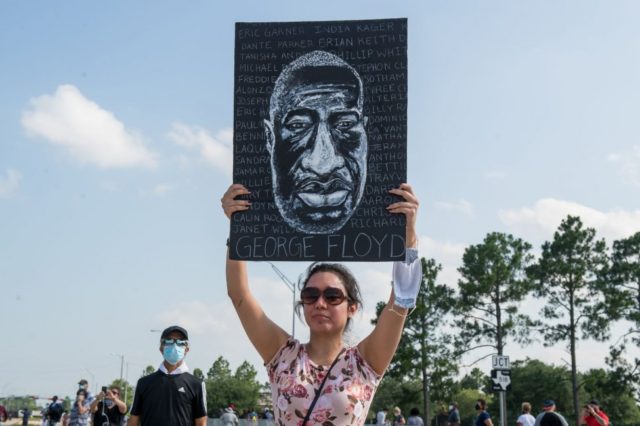April 6 (UPI) — A Los Angeles Police Department use-of-force expert testified Tuesday that former Minneapolis Police officer Derek Chauvin used excessive force in restraining George Floyd last May during the arrest that led to his death.
LAPD Sgt. Jody Stiger testified during Chauvin’s murder trial that his analysis of the May 25, 2020, arrest, during which Chauvin kept his knee pressed to the back of his neck for almost 10 minutes outside a Minneapolis convenience store, showed that there were multiple clear signs the officer should have relented.
“Initially, when Mr. Floyd was being placed in the back seat of the vehicle, the officers were justified in trying to have him comply and sit in the back of the vehicle,” said Stiger, who was hired by the prosecution to review video from the scene. “However, once he was placed in the prone position on the ground, he slowly ceased his resistance and the officers — or ex-officers, I should say — should have slowed down or stopped their force.”
Stiger noted that officers asked for a nylon strap known as a “hobble” that is used to connect a suspect’s ankles and waistline to prevent them from kicking after Floyd once “kicked their arms in an attempt to possibly break free from the officers’ grasp.”
However, the officers ultimately changed their minds and did not attach the restraint to Floyd, which Stiger said was a sign to believe Floyd had calmed.
“Based on my review, I would believe that he was starting to comply, and his aggression was starting to cease,” he said.
He also said there were other factors officers should have considered when deciding the level of force to apply, including the nature of the original alleged offense: the use of a counterfeit $20 bill at a convenience store.
“Typically, in a normal situation you wouldn’t expect to use any force,” Stiger said, describing Floyd’s situation as a low-level offense.
Earlier in the day, Minneapolis Police Lt. Johnny Mercil, a use-of-force instructor with the department’s training unit, testified that Chauvin did not follow proper police training when he placed his knee on Floyd’s neck.
During the proceedings, prosecutor Steve Schleicher showed Mercil, a department veteran since 1996, an image of Chauvin with his knee on Floyd’s neck during the arrest and asked if doing so was an authorized use-of-force.
“I would say no,” Mercil answered.
Defense attorneys have argued that drug use and a pre-existing health condition were the causes of Floyd’s death. Prosecutors contend that Floyd died because Chauvin knelt on his neck.
Minneapolis Police Chief Medaria Arradondo, who testified Monday, also said that Chauvin violated department policy by kneeling on Floyd’s neck while he was handcuffed.
Mercil, who trained Chauvin on defensive tactics, added that “restraint is a form of force” and that applying both force or restraint must be proportional.
“You want to use the least amount of force necessary to meet your objectives, to control,” he said. “And if those lower uses of force do not work, would not work or are too unsafe to try, then you increase the level of force against that person.”
Mercil told prosecutors that police trainers tell officers to stay away from the neck area when restraining a suspect, and instead teach them to place a knee on the shoulder blades. A neck restraint, he said, is defined as “constricting the sides of a person’s neck.”
He added that it often takes less than 10 seconds to render someone unconscious with a neck restraint.
Prosecutors produced documents that showed Chauvin had attended Mercil’s training sessions as well as a session by Sgt. Ker Yang, the department’s crisis intervention training coordinator.
Yang testified that he coordinates with civilian mental health professionals to enable officers to make decisions if they interact with people in crisis with the goal of encouraging them “to see if that person needs help” from medical personnel or other assistance.
He also said the training involves interacting with people who are under the influence of drugs and alcohol or suffering from anxiety and prepares them to “bring them back down.”
“When it is safe and feasible, we shall de-escalate,” Yang said.
The defense questioned Yang about how the officers at the scene received criticism from bystanders as they attempted to restrain Floyd and he testified that the training seeks to teach officers how to determine when bystanders observing police actions “pose a threat or risk” adding that “sometimes police actions can look pretty bad.”
The court had expected it might hear Tuesday from Morries Lester Hall, an acquaintance of Floyd’s who’d accompanied him to the market when the arrest occurred. An attorney for Hall, however, said he doesn’t want to testify.
The attorney added that, if called, Hall would invoke his Fifth Amendment right against self-incrimination. The judge in the case decided not to rule Tuesday whether Hall will be forced to testify. Hall, who’s being held in jail on charges unrelated to Floyd’s death, appeared via video.
Floyd’s girlfriend Courteney Ross testified last week that she and Floyd had obtained drugs from Hall in the past.

COMMENTS
Please let us know if you're having issues with commenting.